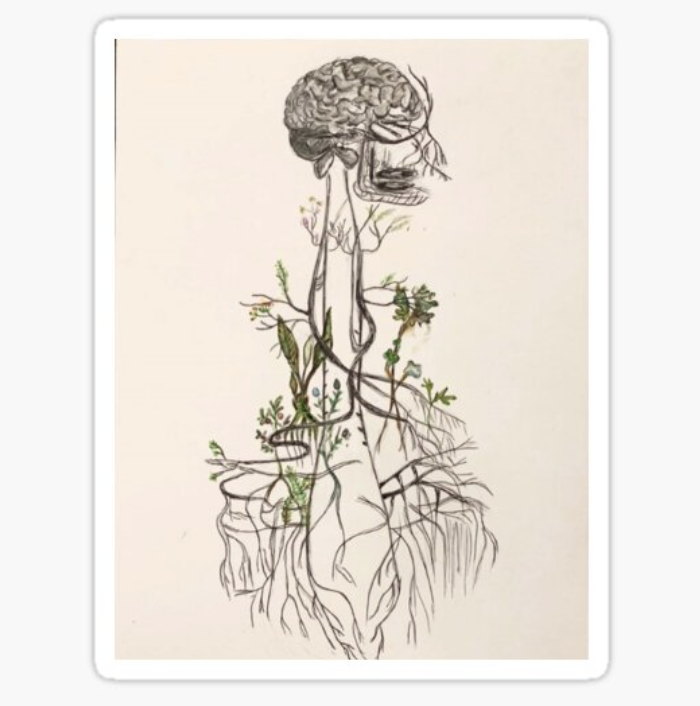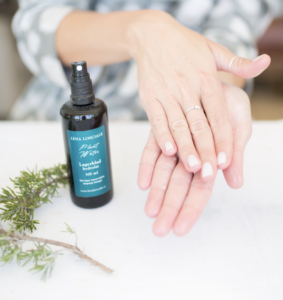
Vagus Nerve Health – The root of our physical and mental well-being?
A fundamental element of my holistic healing process has revolved around the mysterious vagus nerve. I am astonished that I had lived 33 years without recognizing the gravity of this component of our system. With my journey and findings, I hope to bring knowledge and understanding of how to empower our bodies and create equilibrium among the mind, body, and soul; which can be incredibly transformative. I firmly believe that every person can benefit from the understanding and knowledge of this nerve since it significantly affects every part of the body- from HEAD to TOE. Social media has done an excellent job of spreading the fundamentals, but let’s break it down a little more. In upcoming posts I will explore various topics around the vagus nerve in relation to anxiety, gut health, the nervous system, hormones and vagal stimulation techniques.

What is the vagus nerve, and why it is so important?
The vagus nerve connects your brain to the rest of the body and is often referred to as the body’s “superhighway.” It is an essential part of your parasympathetic nervous system, which is a group of nerves responsible for relaxing your body after a stressful or dangerous period. This system controls involuntary functions like digestion, heart rate, mood, and your immune response. It acts as the countermeasure to your sympathetic nervous system, which controls your “fight-or-flight” stress response.
I’ve been following the work of Dr. Perry Nickelstone for some time. From this lymphatic education to his vagus nerve education. He describes – It is the most important nerve in the entire body. It controls the inflammatory reflux of the body, how well you can manage inflammation. The dimmer switch of the body. Inflammation is not the enemy, but uncontrolled inflammation is dangerous. If your vagus nerve is in a parasympathetic state, you can heal optimally.
The sympathetic state is the survival stress mode state. Which ultimately leads to diseases and breaks down of our bodies ( catabolism) . If you have a good vagal tone , it means that it signals efficiently and there is balance between the two modes. The stronger the vagal tone, the better we can adapt to stressors in our life and the more resilience we build.

Here are some key reasons why the vagus nerve is so important:
1. Parasympathetic Nervous System: The vagus nerve is a major component of the parasympathetic nervous system, responsible for regulating the body’s “rest and digest” response. When activated, the vagus nerve helps slow down the heart rate, lower blood pressure, and promote relaxation. It counteracts the effects of the sympathetic nervous system, which triggers the “fight or flight” response, thus helping to maintain a balance in the autonomic nervous system.
2. Heart Function: The vagus nerve plays a crucial role in regulating heart rate and rhythm.
3. Respiratory System: The vagus nerve also influences the respiratory system.
4. Digestive System: This nerve extensively innervates the digestive organs, including the esophagus, stomach, pancreas, liver, and intestines. It stimulates the secretion of digestive enzymes and enhances gastrointestinal motility to aid in digestion and nutrient absorption. Additionally, the vagus nerve sends signals to the brain about the state of the gut, influencing feelings of hunger and satiety.
5. Communication with the Brain: The vagus nerve serves as a major communication pathway between the brain and various organs in the body. It relays sensory information from the gut and other organs to the brain and carries motor commands back to the organs, regulating their functions in response to changing physiological needs.
6. Inflammation and Immune Response: The vagus nerve plays a role in the body’s immune response and inflammation regulation. It can help control excessive inflammation by releasing anti-inflammatory neurotransmitters and inhibiting the production of pro-inflammatory cytokines.
7. Emotional Regulation: Some research suggests that the vagus nerve may be involved in emotional regulation and social bonding. Stimulating the vagus nerve has been shown to have mood-lifting effects and may play a role in reducing stress and anxiety.

Vagus Nerve and Anxiety
If you ever feel anxious, panicky, and you know that this feeling is coming from somewhere specific in your body, addressing the root cause of anxiety requires a holistic approach that goes beyond medication and traditional therapy practices. Medical professionals should look beyond their schools of thought to provide effective treatment options for patients. I have experienced vagus nerve dysregulation at many points of my life. The manifestation of this was both very physical and mental.
Is it possible that anxiety is not just a disorder of the mind but merely a symptom? I came across a wonderful podcast by Dr. Russell Kennedy, a neuroscientist who suffered from crippling anxiety for 30 years. He explains that this “ALARM” is a physiological pattern left by events in our past, usually in childhood. Healing starts by understanding WHERE anxiety lives inside our body. To break the cycle of chronic anxiety, separate the physical sensations of alarm from the anxious thoughts in your mind. Find where you feel the anxiety in your body and focus on managing those sensations.
To effectively handle anxiety, one must locate and embrace it within their body, learn from childhood experiences, and find practical approaches instead of simply managing symptoms. Connect with physical sensations, acknowledge emotions, and show self-love to comfort our younger selves. Regularly soothe our ‘alarm’ to lessen stress and heal trauma. Redirecting focus from thoughts to the body helps ease worrying and identify real issues. Consistent practice frees up mental space, enabling better control of reactions and personal growth.
In upcoming articles- We will start breaking down on techniques for stimulating the vagus nerve. The vagus nerve plays a crucial role in the regulation of the autonomic nervous system, which controls various bodily functions, including the stress response. It is intimately connected to anxiety and can influence its intensity and duration.
Here’s how the vagus nerve relates to anxiety:
1. Parasympathetic Tone: As mentioned earlier, the vagus nerve is a major component of the parasympathetic nervous system, often referred to as the “rest and digest” system. When the vagus nerve is activated, it helps calm the body and mind by reducing heart rate, blood pressure, and stress hormone levels, promoting relaxation. This counteracts the sympathetic nervous system’s “fight or flight” response, which triggers anxiety. This is where the body can heal.
2. Emotional Regulation: The vagus nerve is connected to brain regions responsible for emotional processing and regulation, such as the amygdala and prefrontal cortex. It can influence emotional responses and help dampen excessive feelings of fear and anxiety.
3. Gut-Brain Axis: The vagus nerve is involved in the communication between the gut and the brain, known as the gut-brain axis. Research has shown that the gut microbiome, which influences the vagus nerve, can also have an impact on mood and anxiety levels. A healthy vagus nerve can help maintain a balanced gut-brain axis, which may reduce anxiety.
4. Heart Rate Variability (HRV): The vagus nerve affects heart rate variability, which is the variation in time intervals between consecutive heartbeats. Higher HRV is associated with better stress adaptation and resilience, while lower HRV is linked to increased anxiety and other emotional difficulties. The vagus nerve’s role in modulating HRV can, therefore, influence anxiety levels.
HRV and my journey with wearables ( OURA RING) will be a big topic that I will cover in upcoming articles. It really was the match that lit the fire in me with regards to needing to know and learn more about the nervous system. The journey of discovery around how the stimulate and strengthen my vagal tone is an ongoing one and I will us ethis forum to canvas and explore my discoveries. The ones that worked, the routines I deeply cherish and the lifestyle habits that have become compulsory for me.

Join me on this journey of discovery: In upcoming posts, we will dig deeper into Gut health and the vagus nerve and more techniques that I have learnt along the way on how to stimulate the vagus Nerve and strengthen vagal tone. On the journey of building inner resilience and strength and learning about our incredible machines. Do you have any specific topics that you would like me to explore? Comment below please.
This information is meant to medically advise, Always double check with your medical healthcare practitioner.


